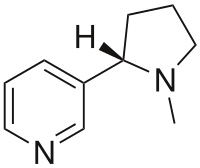
Photo from wikipedia
Our main purpose was to investigate how smoking and nicotine interacted with specific aspects of cognitive functioning, namely attention and working memory. The research was conducted in two parts: (i)… Click to show full abstract
Our main purpose was to investigate how smoking and nicotine interacted with specific aspects of cognitive functioning, namely attention and working memory. The research was conducted in two parts: (i) an investigation of cognition in heavy smokers and healthy nonsmokers, and (ii) an investigation of cognition in healthy nonsmokers enrolled in a clinical trial involving administration of nicotine gum. Results indicated that the relationship between smoking and nicotine was characterized by an inverted U-shaped. On the one hand, cognitive test performance of the heavy smokers group was reduced on all of the cognitive tasks used here. On the other hand, healthy nonsmokers who used 2-mg of nicotine gum performed better, whilst the 4-mg group performed worse than the 2-mg and the placebo group. Demographic data were not related to the outcomes. These data suggest that small doses of nicotine can have an activating function that leads to improved cognition, while heavy smoking on a chronic (and possibly acute) basis leads to cognitive impairment.
Journal Title: Psychiatry Research
Year Published: 2020
Link to full text (if available)
Share on Social Media: Sign Up to like & get
recommendations!